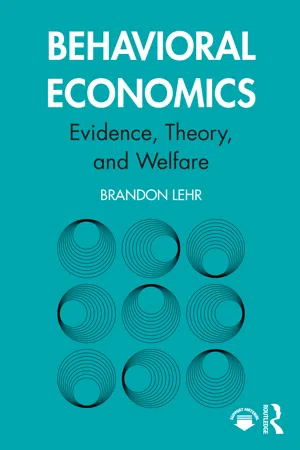The label “behavioral economics” is not particularly informative. Much of economics, after all, is concerned with understanding behaviors — of consumers, families, firms, countries — and their consequences for society. The distinguishing feature of behavioral economics is its focus on integrating insights from psychology into economic settings. As examples, it considers how self-control problems, fairness concerns, overconfidence, and inattention matter for economic outcomes, policy, and welfare. The “behavioral” descriptor acts to underscore the emphasis on actual behaviors, particularly those that are unexpected within the standard economic framework.
This first chapter motivates the study of behavioral economics and introduces the book as a guide to the subject. To begin, I highlight the broad applicability and aims of behavioral economics, followed by a brief intellectual history of psychology’s role in economics. I then provide an orientation to the book’s structure and topics. The chapter concludes with a discussion of empirical methods that readers will encounter throughout the book.
1.1 Why Study Behavioral Economics?
I might argue that behavioral economics is worth studying because it explores an intrinsically compelling set of questions. But there are surely countless compelling topics to investigate within and outside of economics. I could similarly argue that by studying behavioral economics you will further develop your critical thinking and creative problem-solving skills. Or that you will come to see real-world patterns and behaviors in a new way. Once again, these answers are quite general. They fail to answer a more narrow question: why study behavioral economics instead of a different economics topic?
One answer is that behavioral economics has applications to almost every area of economics. It intersects with household decisions about fertility, education, health, work, savings, consumption, and retirement. It impacts our understanding of asset prices, corporate finance, business strategies, and sports behaviors. It is relevant for the evaluation of government policies related to taxes, unemployment insurance, environmental regulation, voting, economic growth, and macroeconomic stabilization. In short, behavioral economics provides a lens through which to see all of economics.
A second answer is that relative to the rest of economics, behavioral economics is uniquely concerned with improving the psychological realism of economic analysis. You might be asking, why wouldn’t all economists prioritize psychological realism? The challenge is that such realism can at times be in tension with other desirable features of an economic theory. In particular, economic theory often aims to build models of behavior with the following features:1
- Generality: the model can be applied across many economic settings.
- Tractability: the model is sufficiently simple in the sense that it can be worked with using standard tools of mathematics and does not rely on large-scale computations to generate insights.
- Realism: the model is grounded in the psychological reality of human behavior.
But a model that is general and tractable tends to be a simple abstraction that ignores certain features of reality. Similarly, a theoretical model that attempts to match the particulars of human psychology in each setting risks becoming overly specific, complex, and intractable (Rabin 2002).
So while economic theory typically prioritizes generality and tractability, we can think of behavioral economics as moving theory closer towards psychological realism. This is not to say that behavioral theory abandons simple models with wide-ranging applicability. In fact, the behavioral models introduced throughout this book are arguably more general and no less tractable than models based on assumptions that neglect psychological realities. The degree to which behavioral theory gives up generality and tractability is a subjective assessment. And in learning behavioral economics, you will be able to make your own judgement about what is gained and what is lost by pushing economic theory in the direction of greater psychological realism.
1.2 Why Behavioral Economics Now? A Brief History
The process of valuation is distinctly a psychological phenomenon, and the problem of value is the fundamental problem in economic science. It may not be too much to say that the next line of advance in economic theory will be distinctly psychological in character, and that the further progress awaits its new impulse at the hands of the psychologist. (Davenport 1902, 355)
Behavioral economics has emerged as a distinct subfield of economics only in the last few decades. It may therefore be surprising to learn that psychology and economics were once more intertwined. The above 1902 quote from economist Hebert Davenport reveals that insights from psychology were indeed valued by early economists. Behavioral economics is then in some sense, a return to psychological concerns that mainstream economists largely ignored for most of the 20th century.
Economics as a distinct field of inquiry developed in the late 18th century with contributions from such well-known figures as Adam Smith, Jeremy Bentham, David Ricardo, and John Stuart Mill. Karl Marx named this early school of thought classical economics, of which Marx is often considered a member as well. Classical economists conceived of the value of goods as arising from the scarcity of inputs, namely land and labor. In this account, value i...
